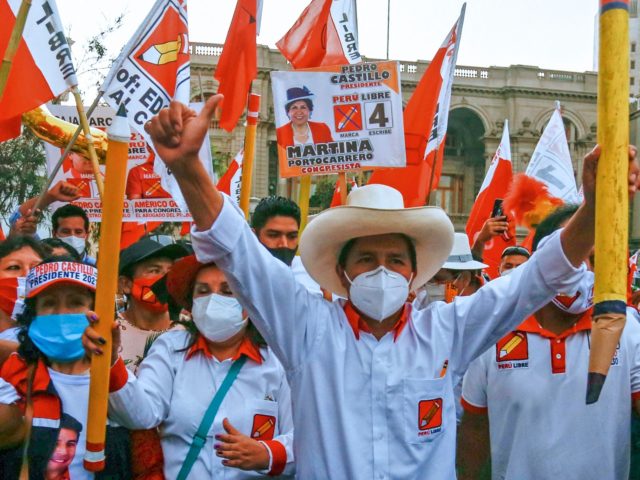Prosecutors in Peru expanded an investigation this week into alleged money laundering by members of the ruling leftist Free Peru party to include party leader Vladimir Cerrón, Prime Minister Guido Bellido, and Cerrón’s brother Waldermar, the official party spokesman in Congress.
Vladimir Cerrón founded the party as a Leninist outfit whose political manifesto praises the Russian Marxist leader and communist dictators like Fidel Castro. Free Peru’s candidate for the presidency this year, Pedro Castillo, won the election after two months of investigations into allegations of voter fraud. He has been president of the country for 13 days.
Peru had three presidents in 2020: Martín Vizcarra, who replaced ousted President Pedro Pablo Kuczynski in 2018; Manuel Merino, who replaced the ousted Vizcarra for five days before being pressured to step down; and bureaucrat Francisco Sagasti who served as a caretaker president through the June 2021 election.
Prosecutor Richard Rojas signed a nearly 50-page memorandum on Friday – which Peruvian newspapers revealed on Monday – detailing the expansion of a prior investigation into money laundering at Free Peru to another 17 people involved in the party. The Cerrón brothers and Guido Bellido were the most prominent names on that list, followed by the current governor of the Junín region, where the party was formed, and several other senior Free Peru advisers.
President Castillo himself reportedly does not appear in the document. Police announced in May, however, that they had opened an investigation into the then-presidential candidate for allegedly lying about having a job as the head of an investment business on his campaign finance disclosures.
The document is not an indictment of any of the new names appearing in it, but rather the beginning of an investigation that could lead to their criminal indictment. In it, Rojas – who specializes in money laundering cases – wrote that evidence suggests that senior leaders of Free Peru used the party to launder “inappropriate” finances as campaign funding. The investigation is reportedly focusing on figuring out where unexplained party funding came from and who benefitted from it; prosecutors suspect Vladimir Cerrón and several others in the party may have benefitted personally from the cash, but require more information to levy that accusation with the full power of the law. Waldemar Cerrón and Bellido stand accused of benefitting from the illicit cash as it was allegedly funneled into their congressional campaigns.
Free Peru currently holds the majority in Congress with 37 seats, followed by the conservative Popular Force party with 24.
In addition to inappropriate Free Peru campaign funding, Rojas detailed an investigation into accusations that the allegedly illicit money, designated for party use only, was funneled into legal and judicial proceedings against Vladimir Cerrón personally.
“The prosecutor’s thesis is that there was an existing criminal organization within Free Peru that has been defrauding the state through acts of conversion of transferring assets coming from criminal activities tied to corruption crimes,” Peru’s El Comercio explained on Monday. “The illicit money, the prosecutor suspects, entered the economic market with an ‘appearance of legality’ through the party, [allowing it] to be used.”
The document noted that Waldemar Cerrón is already implicated in a second, smaller money-laundering investigation for allegedly serving as a “figurehead” for brother Vladimir.
Vladimir Cerrón issued a statement last week, apparently in response to the initial publication of the report, declaring the investigation a “judicial media lynching” and vowing that the Leninist party would “put our chests to the bullet” to defend its principle. Cerrón denied the allegations in their entirety.
Cerrón was one of the most towering figures not on the ballot during this year’s presidential election. Political experts in the country consider him Castillo’s political “godfather” and, as the founder of Free Peru, the true representative of the party’s principles. Cerrón served as governor of Junín, a western province with both Andean mountainous terrain and remote Amazon Rainforest territory, and worked as a neurosurgeon before his entry into politics – a significantly more educated and sophisticated background than Castillo, a former schoolteacher. Many voters expressed concerns that Cerrón – whose tenure as governor was, at best, polarizing in Junín – would serve as a “shadow” president guiding Castillo if elected.
As founder of the party, Cerrón was in charge of drafting the official Free Peru platform, which openly embraces “socialism” and praises several communist mass murderers.
“Socialism does not advocate for freedom of the press, but for a press committed to education and the cohesion of the people,” the document read in part. “[Vladimir] Lenin had a great point when he said that true freedom of the press is only possible when it is liberated from the yoke of capitalism. Fidel [Castro] also said: ‘…mass media are in the hands of those who threaten human survival with their immense economic, technological, and military resources.’”
Castillo has endeavored to distance himself from the unpopular Cerrón and has not offered him a post at press time in his government. Cerrón has also attempted to affirm that Castillo is acting independently.
A poll by the firm CPI published last week found that the campaign to create daylight between Castillo and Cerrón has not succeeded. The poll found that 58.1 percent of Peruvians believe “government decisions by Free Peru depend on Vladimir Cerrón,” according to Radio Programas de Perú. Only 32.2 percent of Peruvians said they believe Castillo “governs autonomously;” another 85 percent said they disagree with Cerrón being involved in the government. Almost half of Peruvians, 45.4 percent, said they had “low confidence” in Castillo’s government – a reflection of the nearly 50-50 split between Castillo and conservative candidate Keiko Fujimori in the presidential election.

COMMENTS
Please let us know if you're having issues with commenting.